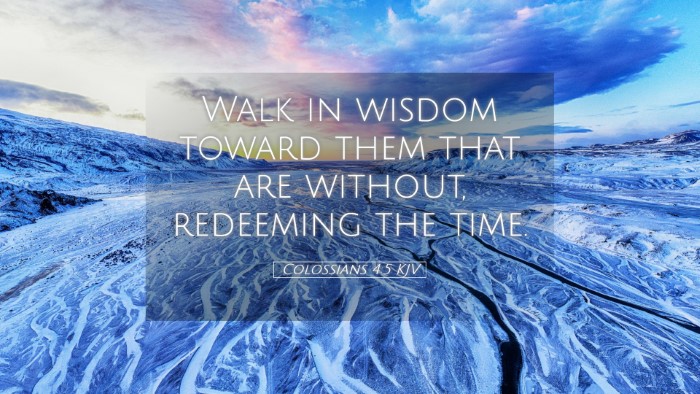Old Testament
Genesis Exodus Leviticus Numbers Deuteronomy Joshua Judges Ruth 1 Samuel 2 Samuel 1 Kings 2 Kings 1 Chronicles 2 Chronicles Ezra Nehemiah Esther Job Psalms Proverbs Ecclesiastes Song of Solomon Isaiah Jeremiah Lamentations Ezekiel Daniel Hosea Joel Amos Obadiah Jonah Micah Nahum Habakkuk Zephaniah Haggai Zechariah MalachiColossians 4:5
Colossians 4:5 KJV
Walk in wisdom toward them that are without, redeeming the time.
Colossians 4:5 Bible Commentary
Commentary on Colossians 4:5
Verse Text: "Walk in wisdom toward outsiders, making the best use of the time." (Colossians 4:5, ESV)
Introduction
The Apostle Paul, in his letter to the Colossians, emphasizes Christian conduct in the face of a non-believing world. Colossians 4:5 encapsulates a potent directive, calling believers to demonstrate wisdom in their interactions with those outside the faith. This verse emphasizes both opportunistic action (“making the best use of the time”) and the application of wisdom in everyday relationships.
Exegesis of the Verse
This verse comprises two main components: “walk in wisdom” and “making the best use of the time.” Each phrase requires incisive theological reflection and practical application.
“Walk in Wisdom”
“Walking in wisdom” is a metaphor for living one’s life, implying a continual and progressive action, reflecting one's character and decisions. Matthew Henry notes that wisdom in this context relates to an understanding that is godly and practical, guiding the believer to act not merely from intellect, but from a heart transformed by the gospel.
Albert Barnes elaborates that this wisdom should be evident not only in thought but also in action. It signifies discretion, sound judgment, and an acute awareness of one’s surroundings and relationships. Paul urges believers to rely on divine wisdom, as flavored by the teachings of Christ, to navigate daily interactions with grace and poise.
“Toward Outsiders”
The term “outsiders” refers to those outside the Christian community, indicative of a broader audience who may be observing the believer’s conduct. Adam Clarke emphasizes the importance of this community engagement, suggesting that our behavior serves as a testament to the faith we profess.
Furthermore, Matthew Henry warns against any form of self-righteousness that may alienate non-believers. Instead, believers are encouraged to foster relationships and demonstrate the genuine love of Christ, serving as a bridge to the message of the gospel.
“Making the Best Use of the Time”
This phrase speaks to the necessity of seizing opportunities, suggesting that time is both limited and precious. Paul underscores the importance of stewardship regarding one’s time and relationships.
Albert Barnes points to the connection between time and eternal matters—believers should focus on evangelism and acts of goodwill that further God’s kingdom. Adam Clarke emphasizes that time is not merely to be spent but utilized for purposes that reflect God's glory and advance the gospel message.
Theological Implications
- The Call to Wisdom: Believers are summoned to apply divine wisdom in all aspects of life, seeking guidance from Scripture and the Holy Spirit.
- The Importance of Missional Living: This verse highlights the missional aspect of Christianity, where believers must be intentional in reaching those who do not share their faith.
- The Urgency of Time: Paul’s exhortation reminds believers of the urgency of their mission; time is fleeting, and opportunities to influence others should not be neglected.
Practical Applications
- Engagement with Non-Believers: Pastors and church leaders should encourage congregants to be active in their communities, fostering genuine, loving relationships with those outside the church.
- Intentional Evangelism: When interacting with non-believers, Christians should regularly look for chances to share their faith, always with kindness and respect.
- Time Management: Encourage believers to evaluate how they spend their time, ensuring that they allocate portions of their days to service and outreach, guided by wisdom.
- Continual Learning: Advise congregants to seek wisdom through study, prayer, and fellowship, thus equipping themselves to engage effectively with outsiders.
Conclusion
Colossians 4:5 provides a crucial paradigm for Living as a Christian in a world filled with non-believers. The careful balance of wisdom and time management in our relationships speaks to the heart of the Christian witness. By embodying the principles outlined in this verse, believers not only honor God but also create pathways for others to encounter the gospel. It is a call to be intentional and reflective, ensuring that our lives are a testament to the transforming power of Christ.


